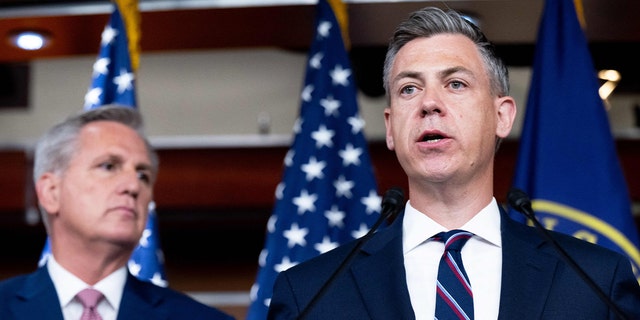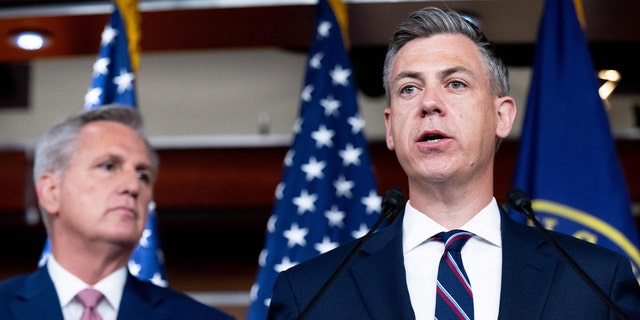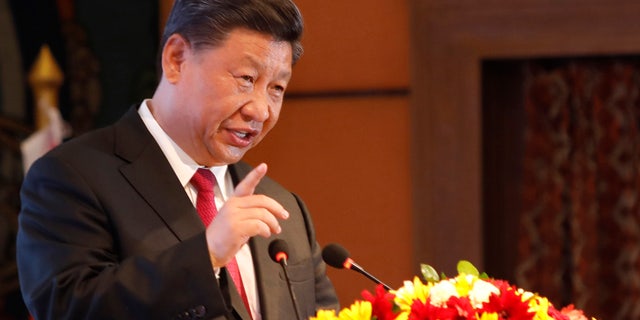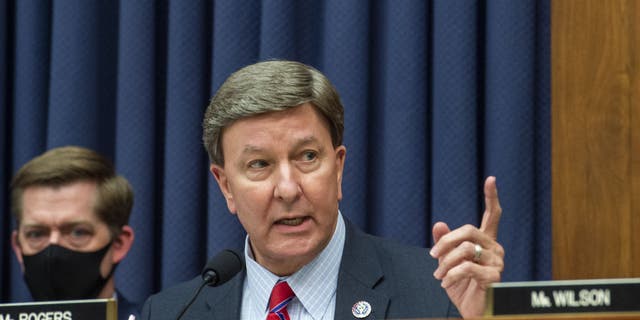
NEWYou can now listen to Fox News articles!
FIRST ON FOX: Several Republican lawmakers are pressing Defense Secretary Lloyd Austin about federal funds going to colleges and universities with ties to the Chinese government.
Republican Study Committee (RSC) chairman Jim Banks, R-Ind., led 56 of his colleagues in the letter to Austin, asking the secretary why federal funds were going to schools that are linked to the People’s Republic of China (PRC).
“During the last administration, Congress finally took important steps to combat China’s illicit influence efforts at U.S. universities, Banks told Fox News Digital in a statement. “When Republicans retake the majority we’ll be able to protect the progress we’ve made from a president who seeks to reset our relations with China to the pre-Trump status quo.”
The lawmakers wrote they were concerned about the Chinese government’s “influence and infiltration in American universities through Confucius Institutes and other partnerships with PRC universities that may pose a national security risk to American universities and the U.S. research and development enterprise.”
HOUSE CONSERVATIVES PREPARE FIGHT AGAINST BIPARTISAN CHINA BILL, AS SENATE MARCHES TOWARD PASSAGE

House Minority Leader Kevin McCarthy, Republican of California, and Representative Jim Banks (R), Republican of Indiana, holds a press conference on Capitol Hill in Washington, DC, June 9, 2022. ((Photo by SAUL LOEB/AFP via Getty Images))
Banks and the Republicans wrote that the presence of Confucius Institutes on American campuses “has long raised serious concerns about PRC government influence and infiltration in our higher education and research systems,” such as the Chinese government stealing American intellectual property.
“In response to these concerns and potential risks, Congress has introduced legislation and passed various laws to address issues surrounding PRC influence on U.S. higher education and research through Confucius Institutes,” the lawmakers wrote.
The lawmakers pointed to the portions of the 2019 and 2021 National Defense Authorization Act (NDAA) — the supersized bill that funds the military — that banned federal funds from going to institutions that hosted a Confucius Institute, a pro-Beijing education organization with ties to the PRC, on campus.
They noted that the 2021 NDAA prohibits “DoD funding for any institution of higher education that hosts a Confucius Institute after October 1, 2023” and that the bills’ “provisions pressured most American universities to close Confucius Institutes on their campuses.”
“Confucius Institutes, however, are far from meeting their demise on our university campuses,” the Republicans wrote. “According to a recent report by the National Association of Scholars, while 104 of the 118 Confucius Institutes on American university campuses have closed, at least 28 universities have replaced the Confucius Institute with a similar program and 58 have maintained the partnership with the PRC university reached as a part of the agreement with Confucius Institute.”

A New York Times guest essay suggested Monday that the Biden administration’s posture on China distracts from Russia. (Bikash Dware/The Rising Nepal via AP))
“The single most common reason universities give when they close a Confucius Institute is that they are replacing it with a new PRC partnership program,” they continued.
The lawmakers cited the same section of the 2021 NDAA that broadened the definition of what a Confucius Institute is “as a cultural institute directly or indirectly (emphasis added) funded, or materially supported by the Government of the People’s Republic of China.’”
They also noted that, when the 2021 NDAA was introduced into Congress, the “Office of Chinese Language Council International (more commonly known as Hanban), the Confucius Institute parent organization under the PRC Ministry of Education, was promptly rebranded as the Center for Language Exchange and Cooperation in July 2020.”
“It then spun off a separate organization – the Chinese International Education Foundation (CIEF), which now funds and oversees Confucius Institutes and many of their reconstituted programs and institutes,” the Republicans explained.
“CIEF is controlled by the PRC government, despite its ostensible non-governmental status,” they added. “Any CIEF-funded cultural program or institute should be considered a Confucius Institute.”
The lawmakers pointed out that the 2021 NDAA section dealing with Confucius Institutes will go into effect on October 1, 2023, “two years after the FY2021 NDAA was enacted.”

Rep. Mike Rogers, R-Ala., is one of the 56 House Republicans who signed onto the letter to Defense Secretary Lloyd Austin about federal funds going to universities tied to the Chinese government. (Photographer: Rod Lamkey/CNP/Bloomberg via Getty Images)
“It provides ample time for universities to sever their link with Confucius Institutes. As such, DoD should stick with the established time frame to implement and enforce provisions in Section 1062 after October 1, 2023, and focus its efforts not only on the Confucius Institutes but also the restructured programs and institutes that continue to serve similar functions and raise similar concerns as the Confucius Institutes,” the letter said.
“Yet, we have learned that DoD has awarded funding with contractual periods extending beyond October 1, 2023 to some universities, including a number of major state universities, which have replaced their Confucius Institute with a similar program or institute directly or indirectly funded, or materially supported by the PRC government,” the letter continued. “According to National Association of Scholars’s recent report, these universities include, but are not limited to, University of Michigan, University of Hawaii Manoa, Michigan State University, University of Minnesota, North Carolina State University, Stony Brook University and the University of Texas at San Antonio.”
The lawmakers wrote the funding “raises a number of questions about how DoD will enforce Section 1062 and whether these universities will receive some sort of exemption enabling them to avoid Congress’s intent to prohibit DoD funding for any institution of higher education that hosts a Confucius Institute” and noted that several Chinese universities partnered with American campuses “have already been recognized by the U.S. government as posing a national security risk to the United States and have been placed on the Department of Commerce’s Entity List.”
CLICK HERE TO GET THE FOX NEWS APP
The lawmakers provided the secretary with a litany of questions regarding the funding to Austin with a deadline of August 15, 2022.
Joining Banks on the letter are 56 of his fellow House Republicans, including House Armed Services Committee ranking member Mike Rodgers of Alabama, House Republican Conference chairwoman Elise Stefanik of New York, and Rep. Lisa McClain of Michigan.
A spokesperson for the Pentagon declined to comment on the letter, telling Fox News Digital that, as “with all congressional correspondence, we will respond directly to the authors of the letter.”








